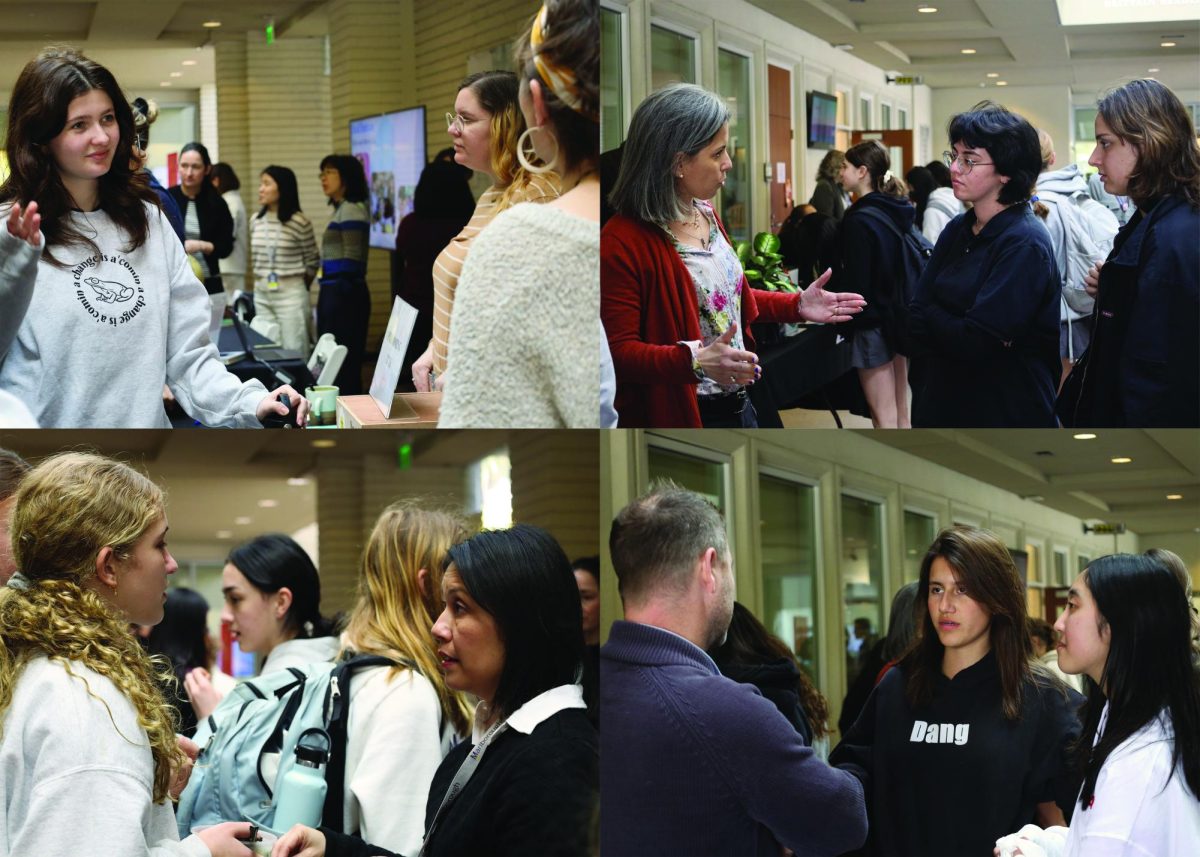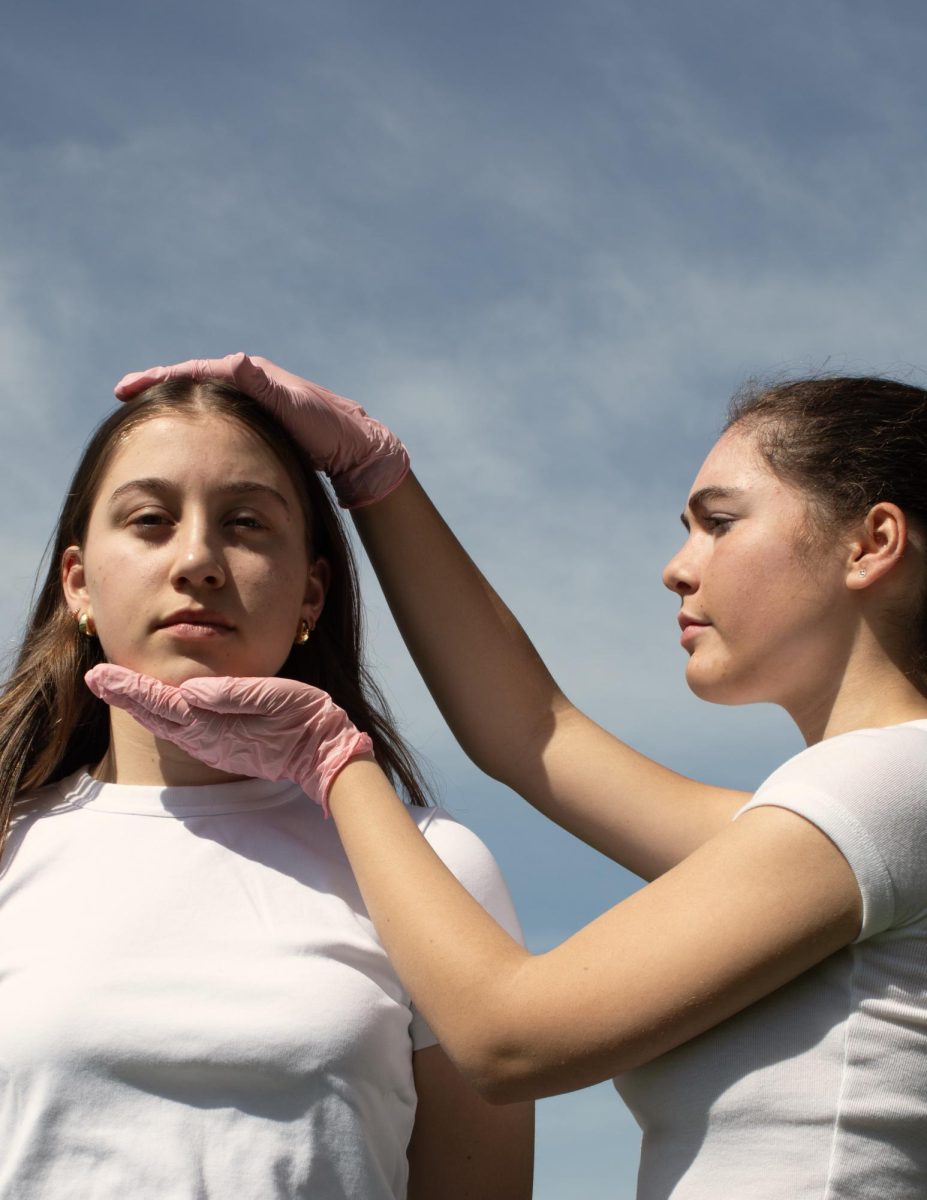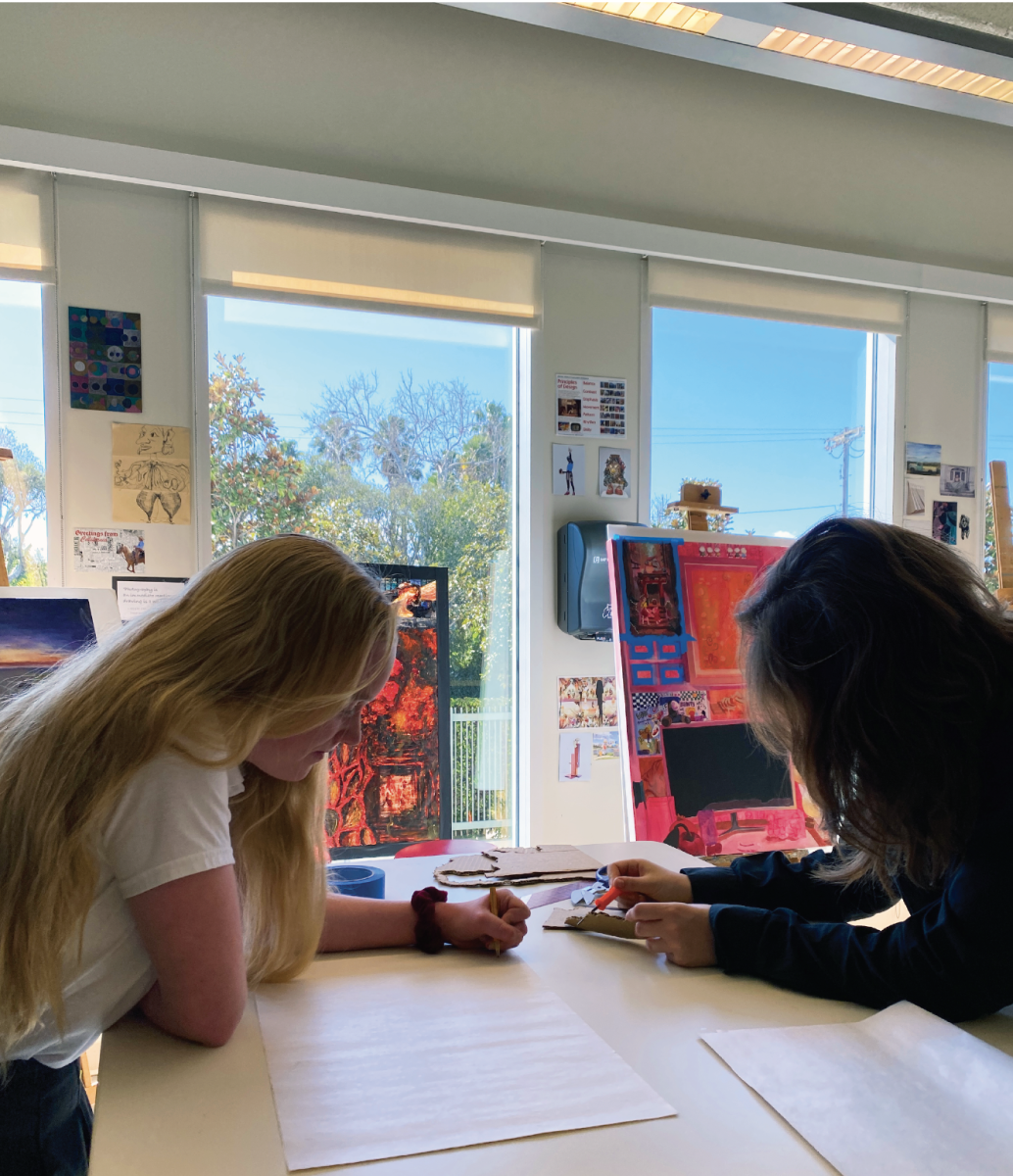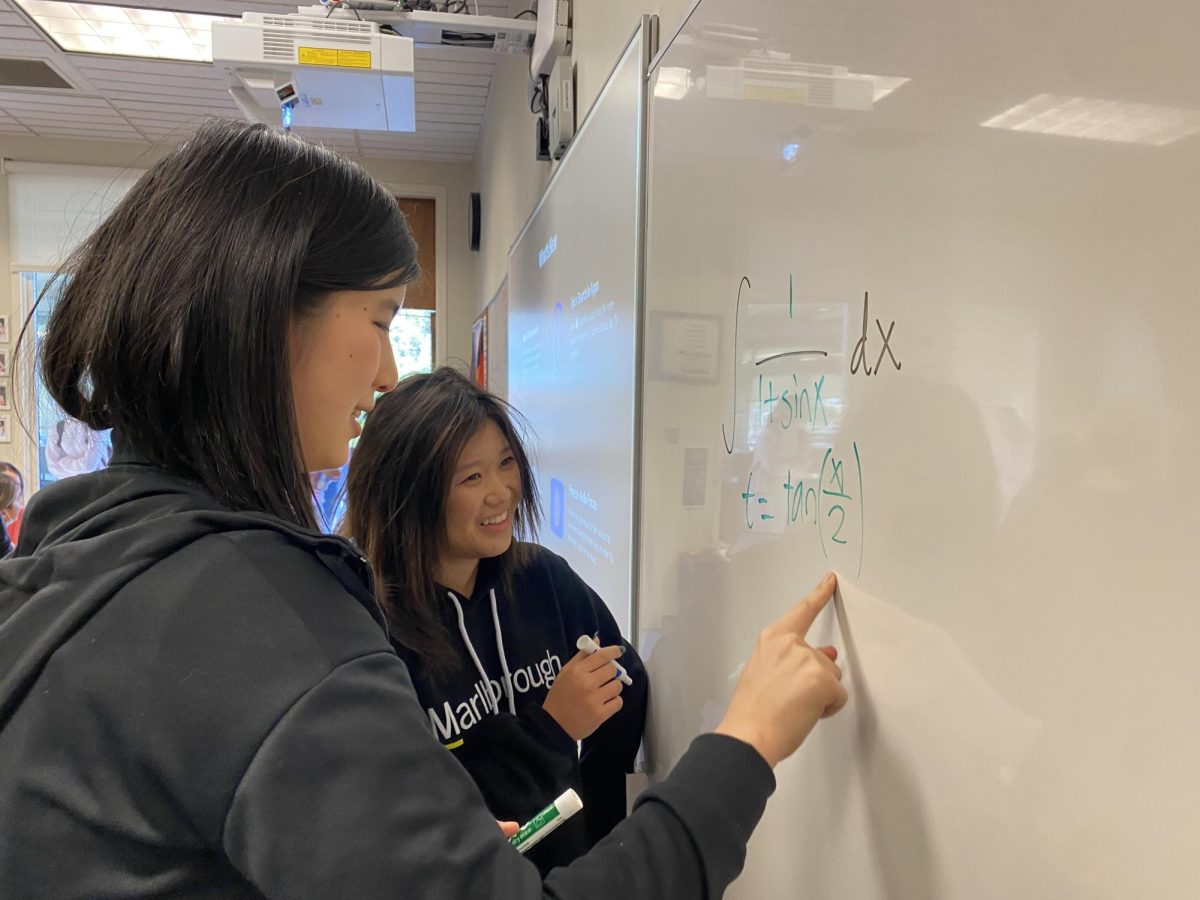As students wander the halls, they overhear conversations of 7th and 8th graders about their newest Drunk Elephant product, their preppy skirt and their plans to take over the world in 20 years. The first members of Gen Alpha, born between 2010 and 2024, have joined the Marlborough community and constitute nearly half of the current 7th and 8th graders.
With 2.8 million people born into Gen Alpha each week, this rapidly growing generation is predicted to reach 2 billion by next year according to Britannica.
When the COVID-19 pandemic inhibited in-person learning in 2020, the oldest members of Gen Alpha were 10 years old. Isolation from other children at such a critical age for social and educational development strained Gen Alpha’s ability to socialize. Though COVID-19 hampered socialization, Gen Alpha gained experience in navigating technology.
In fact, one of the most significant features that differentiates Gen Alpha from Gen Z is their exposure to technology at an early age. Smartphones and social media were invented before Gen Alpha was born, whereas the iPhone and iPad were created for those in Gen Z. Whether or not this exposure to technology has negatively or positively impacted Gen Alpha is highly controversial.
Some argue that Gen Alpha’s early exposure to technology has given them the benefit of online experience and technical knowledge, which translates into higher rates of entrepreneurship. After all, the oldest Gen Alpha kids were born in 2010, the same year that the iPad was introduced, Instagram was created and the word “app” was the word of the year.
Their early access to online resources will likely make them the most innovative and tech-savvy generation to date, according to “Understanding Generation Alpha,” a paper published by the research firm McCrindle. A rising number of children are creating online businesses, enabling them to gain entrepreneurial experiences and operate profitable companies. A study by Yahoo Finance showed that the number of teenagers founding businesses has increased eightfold in the past decade and this trend is predicted to continue with Gen Alpha.
Moreover, thanks to social media, Gen Alpha has the potential to become more culturally aware and develop a deeper understanding of diverse identities than older generations.
In addition to a greater sense of cultural awareness, members of Gen Alpha are more conscious of environmental issues, since they are witnessing its effects firsthand.
The survey shows that “an incredible seven in ten (71 percent) seven- to 12-year-olds are increasingly worried about the effects we’re having on the planet.”
Similarly, media networking agency, Wavemaker Global, predicts that Gen Alpha will continue to prioritize climate change when they reach the voting age. Forbes predicts that climate change, poverty, refugee crises, digital disinformation and mental health are some of the issues that Gen Alpha are the most passionate about.
“Eighty percent of parents say their children have influenced their actions or consumption decisions, making them more environmentally aware,” Wavemaker Global said.
Another benefit of being born in Gen Alpha is that they are living in a time of constant medical advancements, improved public health measures and the decline of unhealthy habits such as smoking. This leads experts from the online and print magazine Creative Review to anticipate members of Gen Alpha to live to an average of 73 years old, which is 10 years longer than the life expectancy of millennials. In some parts of the world, such as the United States and Australia, Gen Alpha’s life expectancy is slated to reach the 80s.
Their long life expectancy suggests that members of Gen Alpha will dedicate more time to higher education and hold longer professional careers.
Although some consider Gen Alpha to be tech-savvy and conscientious, the generation has certain setbacks that distinguish it from past generations.
Because of Gen Alpha’s constant technology use, experts believe that these digital natives will rely more heavily on electronic devices in everyday life than other generations. According to Morning Consult, 54% of Gen Alpha children currently own an iPad. In contrast, baby boomers and millennials grew up before the release of the first Apple iPad.
Moreover, the growing prevalence of short videos on social media platforms has caused kids in Gen Alpha to develop shorter attention spans. Apps such as TikTok and Instagram have engineered algorithms that offer exciting videos designed to maintain a user’s attention for a few seconds while enticing them to scroll. The algorithm brings its users instant gratification, a satisfying yet addictive feeling that has negative implications.
“While all that instant gratification may be convenient, we are warned that it’s ruining a long-standing human virtue: The ability to wait,” tech columnist Alexandra Samuel wrote in JSTOR Daily.
According to Ofcom, this short, hyper-focus weakens concentration, preventing Gen Alphas from focusing on one subject for extended periods of time.
High school student, Conrad, worked with 6 and 7-year-olds this past summer and commented on their general lack of attention when measured against campers of similar age in previous years.
“Compared to when I was 6 years old in 2013, kids of this new generation are loud, restless and incredibly difficult people to work with socially,” Conrad said. “[They are] always interrupting leaders during activities, having little respect for one another and unable to sit still for more than a few minutes.”
Aside from their behavioral issues, members of Gen Alpha have also faced difficulties in their social development, as quarantine prevented face-to-face contact during key years for social development
“While Zoom and virtual dinner parties have enabled much needed social interaction, in many ways it cannot replace the face to face interaction that is crucial to child development and socialization,” social researcher Ashley Bell said.
JAMA Pediatrics, a journal published by the American Medical Association, conducted a study analyzing the effects of hybrid and virtual learning during quarantine on children’s behavioral health. The majority of the 405 parents who participated in the study reported that their children exhibited worse behavior due to remote learning. When Gen Alpha returned to in-person learning, they appeared to have a more difficult adjustment than Gen Z. Then, in 2020, JAMA conducted a study that found that screen usage is directly associated with lower language skills in children.
Teachers experiencing the aftereffects of quarantined Gen Alphas are expressing their frustrations. Having learned in-person school norms late, Gen Alphas tend to be more aggressive and unruly towards many educators and peers.
“I teach 7th graders, and they are performing on a 4th grade level,” a teacher in a TikTok video by Teresa Newman said.
“You’re asking them to sit in their spot and they respond, ‘You don’t get to tell me what to do– you’re not my mom,’ ” another teacher in the same video said.
Concerns around Gen Alpha’s behavior are not uncommon. They are also facing backlash from social media users, primarily on TikTok and Instagram, who derogatorily refer to Gen Alphas as “iPad kids” for their inappropriate use of technology in public.
“You’re raising Gen Alpha – they’re bizarre and terribly behaved,” TikTok user Gabe Escobar said. “Y’all bred iPad kids. You’ve been shoving media and screens in these kids’ faces since birth … If I’m older and with my kids and bring them to a restaurant and see fellow parents and their kids have iPads in public, I’m going to scream.”
In addition to their short attention spans and behavior, Gen Alpha has received public disapproval for their obsession with skincare. In the past two years alone, a large amount of pre-teens have posted viral TikTok videos featuring expensive skincare products from Sephora and other beauty companies. One favorite among the pre-teens is the Drunk Elephant A-Passioni Retinol Cream.
Gen Alpha’s widespread use of products containing retinol, an ingredient known to tighten skin and reduce fine lines, originally targeted at older women, has particularly sparked controversy.
“A lot of the time, these are not going to provide a lot of age-appropriate benefits for children and in some cases they may actually be harmful for the skin of teenagers,” Canadian dermatologist Dr. Natalie Cunningham said.
Some people are not only concerned about the skin damage that comes from Gen Alpha using anti-aging products, but are also irked by their disruptive presence in beauty stores, aligning with the trope that members of Gen Alpha lack understanding of social cues.
“I can’t bring myself to go into [Sephora] anymore because teenagers are running (for whatever reason) and destroying the samples, putting their hands in absolutely everything and not making it sanitary anymore,” Sephora user @blackolives said. “Maybe some adult supervision and store etiquette would be beneficial for them.”
Moreover, literacy rates among Gen Alpha members have fallen dramatically, and research blamesthe increase in screen time during the COVID-19 pandemic.
According to Peggy Carr, thecommissioner of the National Center for Education Statistics, math and reading rates among 13-year-olds in the U.S. have dropped to levels similar to the 1970s. When the pandemic hit and school became remote, which interfered with their in-person academic instruction.
“Part of the problem is that even before the pandemic, as much as a decade ago, we were already seeing declines for these students, especially for the lower-performing ones,” Carr said. “And the pandemic, well, it just accelerated these declines that we’re seeing today.
This school year, it has been of interest to some students that Marlborough 7th and 8th graders are a part of Gen Alpha. Interviews with students in Gen Alpha and their teachers revealed how they feel about the generation and its distinct qualities.
Teachers report that they are adapting to their Gen Alpha students’ new academic and social habits.
Mathematics Instructor Jennifer Uribe has noticed that retaining the attention of her current 7th graders has been more difficult than in previous years.
“Because they had so much going on around them for so long … you have to work really hard to make them focus on you,” Uribe said. “That means that I have to constantly be changing what I’m doing to shift gears for them.”
Uribe has recently implemented breaks in her classes to allow her students to release their energy.
“In many respects, they’re the same as everybody else, they just need help focusing a little bit more,” Uribe said.
Conversely, English Instructor Jessica Wiseman believes that lower focus levels during class are common for 7th and 8th graders who are younger and less mature than the rest of the student body regardless of generation.
“I think students are just as rambunctious as usual,” Wiseman said. “I think that’s part of the 7th grade experience. It’s not as quiet, it’s more joyful in a way. There’s more energy because they’re younger and they’re fresh out of 6th grade.”
Despite an overall consensus categorizing Gen Alpha as tech-savvy, both Wiseman and Uribe have noticed a decline in technological skills from their students. Uribe said that her students have trouble locating educational sources and believes this challenge arises from relying on their teachers during online school to navigate online resources.
“More than ever, students do not know how to do things on a computer that was once taught in schools,” Wiseman said. “If I say ‘right click,’ a lot of students don’t know what that means. I think phone usage in a way has replaced computer skills.”
Despite their supposed lack of digital proficiency, Gen Alpha students are well-versed in makeup products and other topics that are popular on TikTok. For example, in Wiseman’s creative writing class, students were tasked with choosing settings to practice their descriptive skills. Some settings chosen by students include Sephora, a mall parking lot and Dear Hannah Prep, a preppy clothing store in Texas that has gained immense fame on TikTok.
“It did say something about what’s on the minds of 7th and 8th graders right now … I think the pandemic affected us all, but I’m sure it has had a social impact on my students,” Wiseman said.
Some Gen Alpha students feel that their years of online learning, which began in 3rd and 4th grade and ended in 5th and 6th grade, continue to affect their daily lives.
“Unfortunately, yes,” Arabella ’28 said when asked if she knew what it meant to be a part of Gen Alpha.
Arabella’s statement echoes the negative connotations some internet users and the general public associate with Gen Alpha.
“Crusty little children. They are iPad kids who are six-years-old,” Arabella said.
Snowden ’29 found distance learning difficult due to the lack of social connection with her peers.
“Third and 4th grade when we were all in lockdown was … a mess for everyone,” Snowden said. “The socialization was really bad, and I didn’t have anyone to talk to. People were like ‘I hate everyone, I just want to be alone in my room with my iPad.’”
Arabella expressed feelings that aligned with the research conducted by JAMA Pediatrics showing the negative effects on the social development of children who experienced remote learning at a young age.
“I wasn’t exposed to people from a young age, for like a year or two, so… I’m not that social,” Arabella said.
Ella ’29 also commented on the difficulties many Gen Alpha members face due to the lack of in-person interaction during quarantine.
“A bunch of people in my grade were not mature and didn’t know how to talk to people,” Ella said. “When I was in 3rd grade, COVID happened. I feel like that was a prime time for kids my age to learn how to socialize and mature. Some people didn’t really learn and needed that human experience.”






















